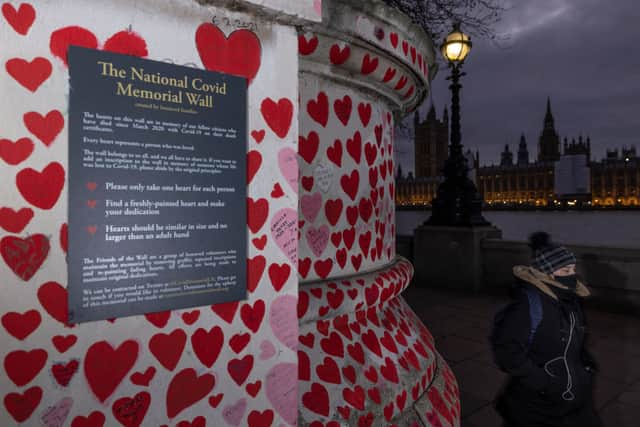Covid-19 public inquiry: hearings on government response to pandemic and impact on health system to begin
and live on Freeview channel 276
A rigorous investigation into how the UK handled the Covid-19 pandemic will turn its eye to the impact on patients, NHS and social care staff, and the public this week, before honing in on the Government response.
The official inquiry into the Covid-19 pandemic began back in October 2022, with former Court of Appeal judge Baroness Heather Hallett holding the first preliminary hearing on the resilience and preparedness of the UK for a pandemic.
Advertisement
Hide AdAdvertisement
Hide AdInitial hearings on the other two major facets of her investigation will kick off this week. The hearing on the pandemic’s impact on the healthcare system will take place on Tuesday (28 February), while hearings on the Government response across the UK’s four countries will begin on Wednesday (1 March).
But what exactly is the investigation looking at, and how will the inquiry evolve?
Here’s what you need to know.


When did the Covid inquiry begin?
The preliminary hearings for module 1 of the inquiry began on 4 October in London.
The inquiry is expected to last at least a year, with the first evidence sessions starting in spring 2023.
Advertisement
Hide AdAdvertisement
Hide AdA minute’s silence was held for those who lost their lives, with Lady Hallett saying: “There’s one word that sums up the pandemic for so many, and that is the word ‘loss’.
“Although there were positive aspects of the pandemic, for example, the way in which communities banded together to help each other and the vulnerable, millions of people suffered loss, including the loss of friends and family members; the loss of good health – both mental and physical; economic loss; the loss of educational opportunities and the loss of social interaction.
“Those who are bereaved lost the most.
“They lost loved ones and the ability to mourn properly.”
Dozens of lawyers, making up teams representing more than 20 core participants, stood with their heads bowed and hands clasped.
What will the inquiry look at?
Lady Hallett said the inquiry would analyse how the Covid pandemic unfolded and would determine whether the “level of loss was inevitable or whether things could have been done better”.
Advertisement
Hide AdAdvertisement
Hide AdShe added: “My principal aim is to produce reports and recommendations before another disaster strikes the four nations of the UK and, if it is possible, to reduce the number of deaths, the suffering and the hardship.
“I have a duty to the public to conduct a thorough, fair and independent inquiry for the whole of the UK and I intend to do so.”
The former judge promised that the inquiry would “not drag on for decades, producing reports when it is too late for them to do any good”.
She added: “I promised the bereaved during the consultation process on the terms of reference that those who have suffered will be at the heart of the inquiry and I intend to keep that promise.”
Advertisement
Hide AdAdvertisement
Hide AdHowever, she said she would not be able to cover every issue people wanted covering or every issue in as much detail “as some may wish”.
But she assured families that “no decision will be taken lightly”, as she also promised to look at the use of do-not-resuscitate orders in the NHS and the quality of care given to people.
What are the modules for the inquiry?
The inquiry is so wide-ranging that it has been split into three modules, with more to be announced.
Module 1 will examine the resilience and preparedness of the UK for a coronavirus pandemic.
Advertisement
Hide AdAdvertisement
Hide AdThe inquiry was told that 28 individuals and organisations have been granted core participant status for the first module of the inquiry.
These include groups representing the bereaved in each of the UK nations, the NHS, the UK Health Security Agency, the Treasury, Secretary of State for Health and Social Care, Home Office, Department for Business, Energy and Industrial Strategy, Department for Environment, Food and Rural Affairs, Local Government Association and National Police Chiefs Council.
Trade unions such as the Trades Union Congress and British Medical Association are also core participants.
Module 2 will examine decisions taken by the Prime Minister and the Cabinet, as advised by the civil service, senior political, scientific and medical advisers, and relevant committees.
Module 3 will investigate the impact of Covid on healthcare systems, including on patients, hospitals and other healthcare workers and staff.
Comment Guidelines
National World encourages reader discussion on our stories. User feedback, insights and back-and-forth exchanges add a rich layer of context to reporting. Please review our Community Guidelines before commenting.
